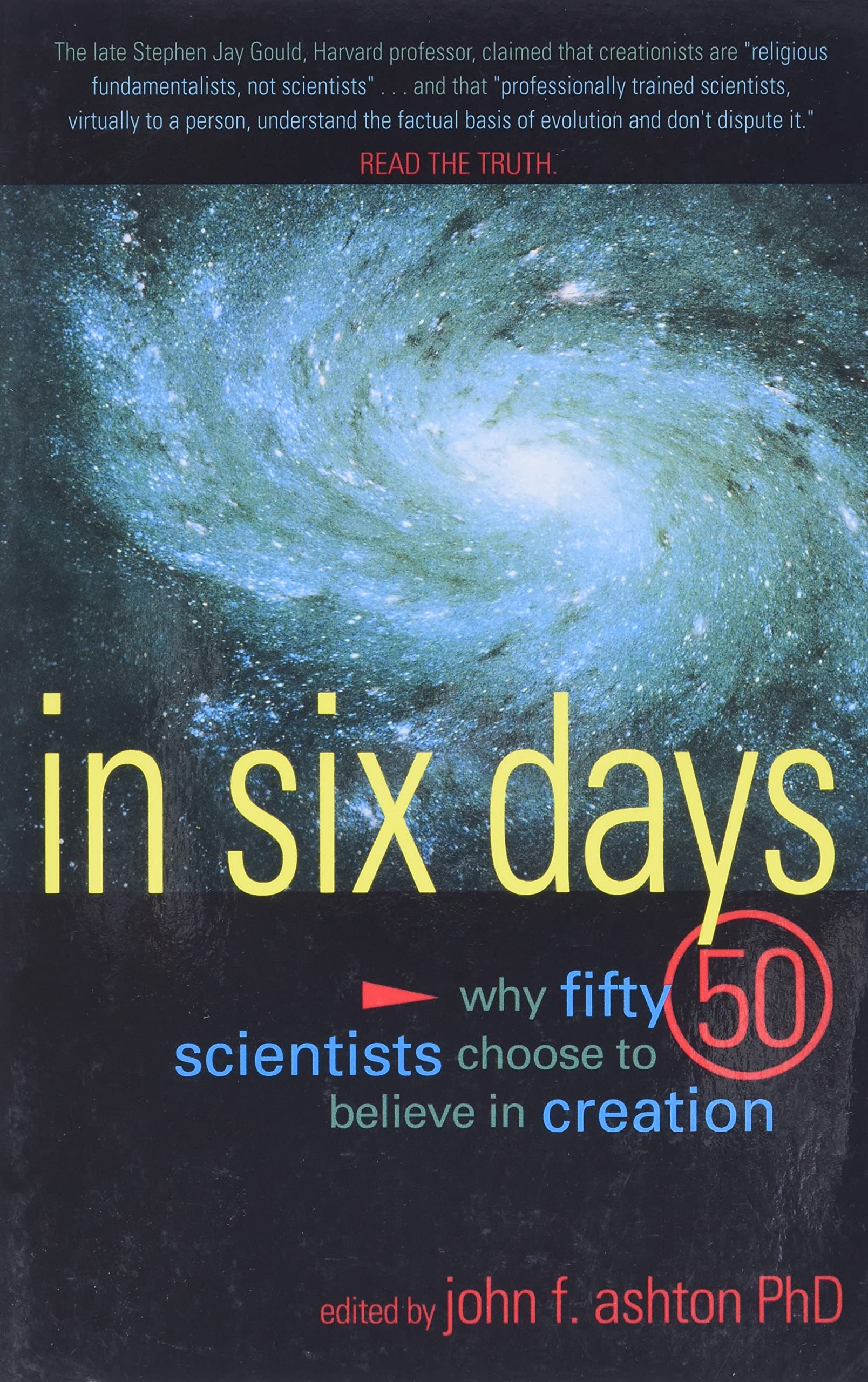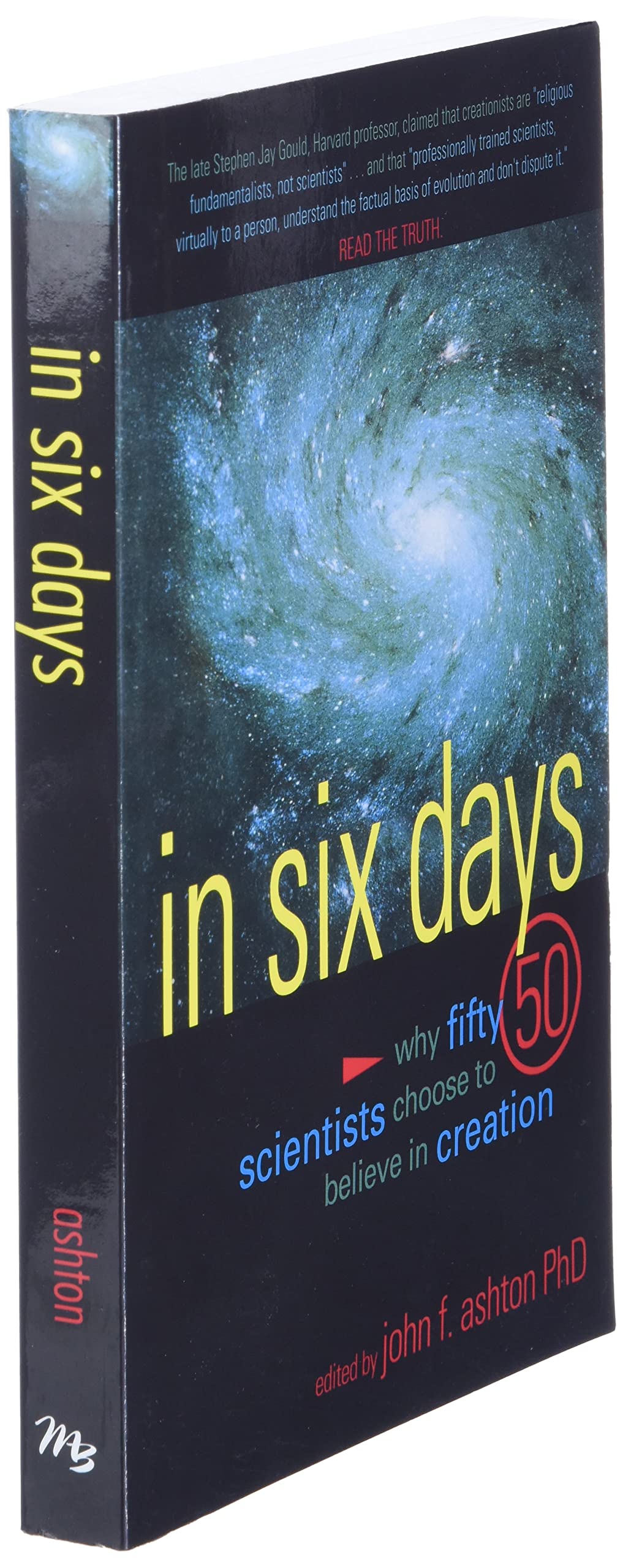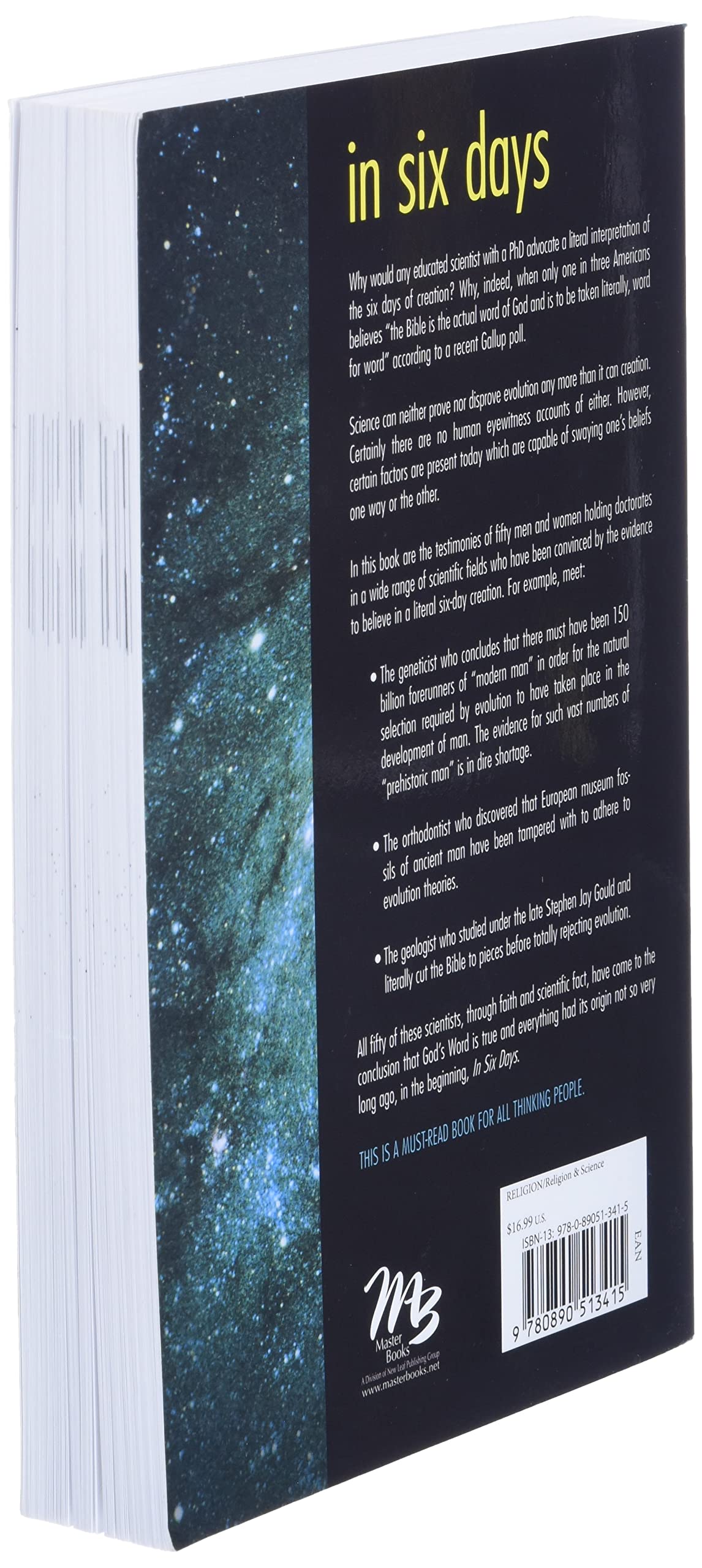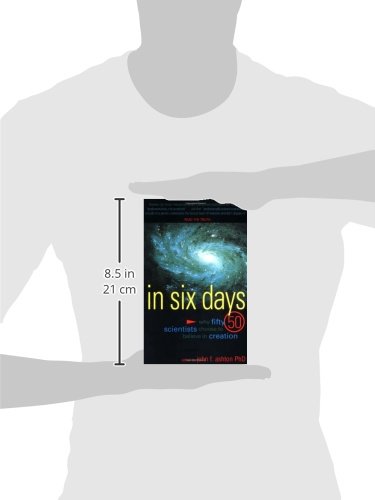





In Six Days: Why Fifty Scientists Choose to Believe in Creation
J**O
Creation is fact, fact, fact!
This is a most valuable collection of essays. They show the obvious: there is no evidence, whatsoever, of abiogenesis, common ancestor, intermediate forms in the fossil record and in molecular biology, information generating mutations, and so on. What keeps evolution alive is naturalistic assumptions, plus circunstantial evidence (regardless of the fact that this evidence can be better predicted and accounted for through a creationist model) and naturalism-of-the-gaps-kind-of-faith. I only whish some of these authors would have developped their arguments a bit more, since the overall result, although quite interesting and stimulating, is a bit umbalanced.Maybe next time these and other creationist can put up a "Summa Teologico-Creationistica" or some kind of Creationist Encyclopledia or Treatise that could speak directly to the scientific community.My personal experience tells me that many scientists, while publicly afraid to show any interest in creationism, are already in the level of privately entertaining the thought that creationism may be right after all. The reason for that is that both arguments for creation and against evolution are increasing quantitatively and qualitatively in an exponentional way in all disciplines. This book has the advantage of allowing us a glimpse og the big picture, by exploring arguments in the fields of biology, chemistry, ecology, geology, geophysics, astronomy, physics, astrophysics, information theory, probabilities. All these disciplines cry out loud: creation is fact, fact, fact!
T**L
Great Book
I was inspired to purchase this book while taking a class about the Old Testament. It's worthwhile and enlightening to read the creationist vs. evolutionist arguments within the scientific community.
F**I
Genesis is Right, would God have to tell another story?
I found this book to be difficult to put down and stop reading. Each of the 50 contributors presented logical reasons for the creation rather than evolution. Dividing the book into 2 parts, the beginning essays presented a scientific basis for creation. The second part presented scientific review of the biblical support for creation of life and the appearance of multiple forms of life, animals, humans, plants on the earth.A Christian believer in the Bible, but has adapted the 6 days of creation into a novel definition of a day as millions of years is asked why (1) the creator needed so long a time to create the various species, yet in the new testament the Son of God changes water into wine, feeds 5000 men sufficient bread from 5 barley loaves and has baskets of left overs, is able to cure a homorganic women, raise Lazarus from the dead, all within an instant. A believer of all of the incidents, lessons, commandments in the Bible, can't believe that the story in Genesis is allegorical and not a true story. A day is 24 hours, and if God had to rely on millions of years to create the living species that populate the earth, one might believe that God is a god, not GOD.The complexities of the beings created can not be explained by evolution. The species we have today are the same species of old. And if there were precursors, where are the fossils to prove the theory of evolution?I liked the book.
K**
Commentary
Excellent
K**I
You don't have to buy into Genesis
You don't have to buy into Genesis to believe that Darwin's theory on the origin of species has not been proven. This book is a collection of essays by fifty scientists and engineers with doctoral degrees who all believe the world was created in six days less than 7,000 years ago.In one of the essays, Danny Faulkner, a professor of astronomy and physics, admits that there are scientific findings that indicate that the universe is much more than 7,000 years old. He says, "The universe appears to be billions of light years in size, so how can we see distant objects if the universe is only a few thousand years old?" With the Hubble telescope, the most distant object it shows appears to be a galaxy 13.2 billion light years away. Faulkner's opinion is that creationists have not come up with a satisfactory explanation for this.Evidence accepted by most scientists that the earth is 4.56 billion years old comes from radioactive dating. The ratios of uranium to lead in zircons is considered one of the most reliable methods of radioactive dating. John Baumgardner, who has a Ph.D. in geophysics and space physics from UCLA, finds fault with uranium to lead dating. When uranium decays to lead, helium is produced. In Precambrian zircons the amounts of lead and uranium indicate the rocks are over a billion years old. "However, based on experimentally measured helium diffusion rates, the zircon helium content implies a time span of only a few thousand years since the majority of the nuclear decay occurred."An argument for the young earth school is that, even after correcting for man's agricultural activities, the rate of erosion is such that it would take on the order of ten million years for the continents to erode into the ocean. In other words, the earth should have been covered with water long ago, if it is as old as the evolutionists say it is.When Darwin wrote "Origin of Species" in 1859, no one knew about the complexity of cell structure, genes, and biochemical processes. While some of the essays in Ashton's book are more arcane than others, I think that anyone who has had undergraduate courses in biology, statistics, chemistry, and physics should be able to follow most of them. I find it obvious that the belief that life started spontaneously from non-life violates the second law of thermodynamics no matter how old the earth is.So many biological processes are cyclical. That is, all the stages of the process have to be there from the beginning. As John P. Marcus points out, "Without the cellular machinery, we would have no DNA since it is responsible for synthesizing DNA; without DNA we would have no cellular machinery. Since DNA and the machinery of the cell are co-dependent, the complete system must be present from the beginning, or it will be meaningless bits and pieces."Here is one simple example of an argument for a six-day creation. Most plants depend on bees to pollinate them. Bees depend on pollen for their food. How could they have evolved independently of each other over millions of years?Of course, saying that God made the earth and all that it is in it doesn't answer the question of where God came from. If you don't buy into Genesis, I think the only intellectually honest answer to how life arose is, "We don't know."
J**N
Lots of facts and evidence
If you like fact filled, evidence driven creation books then this book hits all the marks. It was a bit hard to get through at times because some of the scientist where talking way above my head, but I found it extremely interesting how these scientist where convinced, from the evidence, that a creation world view is the only explanation to what we see in the world today. You hear the left constantly say "All Scientist Agree" on evolution...Well here's 50 that don't! come find out why, it just might surprise you.
A**S
Ain't God the truth... Like He said♡
Well worth the read... God without a doubt but some people need more proof... try reading His Word but nice to see some serious scientists can admit TRUTH
M**N
Helpful
Having only recently become aware of the arguments which consume the apologists on both sides of the issuesregarding science vs creation I found in John Ashton's " in six days " some of the reassurance I was looking for afterI started to comprehend some of the enormity posed by the subjects matter. Since one's perspective is the keyand no one is without bias , I was particularly impressed by Danny Faulkner's contribution to the book whosework in Astronomy not only gave credible cosmic arguments in favour of a recent creation but also pushed formuch more inquiry by creation scientists in this field.
M**T
For God botherers and Not God botherers - a must read.
Whether you believe in God or believe there isn’t a God, this is an extremely educative read. Many of the Scientists here give essentially the same type of explanation for their opinion – that the world is thousands of years old (in its present form) not 4.6 thousand million. Set that aside – because the differences, the variety of Scientific points is dazzling. Yes, yes, most of them believe in the Bible as read – but that has usually led to some very very good Science. Many of the points raised are shockers – faked results being only one of these. If you are certain that Evolution is the only solution then read this – your certainty will not last until the end of the book. However, this does not prove that the ONLY alternative to Evolution is a Divine Creator. What it does prove is that we, as a species, do not have much of an idea of what really happened. For sure Evolution, as this book clearly proves, is a fairy tale – it is on more than fifty counts – Impossible. Believer in or Believer in not, if you care you should read this.
M**I
An excellent resource that addresses an important exegetical issue
Intelligent, deep, well-informed, short articles in support of the 'minority' interpretation of the first chapter of the Book of Genesis. Old Earth creationists (those currently holding the broadly accepted understanding of the span of time in which God created) would be advised to read it. For those of us who, reading the Bible, cannot but think that the word 'day' in Genesis 1 refers to a 24hrs period, it is an indespensable apologetic tool.
T**A
Five Stars
Awesome book!
Trustpilot
3 weeks ago
2 weeks ago